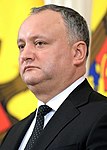Signature collection
Marian Lupu, the candidate of the Democratic Party of Moldova, collected over 20,000 signatures in his support and submitted them to the Central Electoral Commission in less than a day. [7] The swiftness of the procedure was deemed suspicious, because the required stamps and signatures had to be obtained from public institutions that were closed at the time the party supporters could have collected them.
An independent candidate, Oleg Brega, filed a complaint with the Commission, indicating that the DPM must have received preferential treatment as their paperwork was handled on Friday after working hours, as well as on Saturday, a non-working day. [8] The CEC dismissed the complaint and in the aftermath Brega decided to drop out of the presidential race, considering it unfair. A separate complaint was filed by Andrei Năstase on the same grounds. [9]
Lupu stated that it was due to the effectiveness of his staff, rather than cheating.
Voter roll
Prior to the elections the Central Electoral Commission announced that the total number of voters was 3.2 million, an implausible figure, given the steady decline in Moldova's population, [10] and the fact that preliminary results of the 2014 demographic survey indicated that the total population of the country was only three million. [11]
An independent investigation revealed that the lists of voters prepared by the Central Electoral Commission were inaccurate and contained a significant number of deceased people. [12] From a sample of 300 deceased, 100 were still listed as eligible to cast their vote, according to the online voter registry managed by the CEC.
The voter list included some prominent figures, such as the movie director Emil Loteanu (died in 2003), the actor Mihai Volontir (died in 2015) and the journalist Constantin Tănase (died in 2014).
The Commission acknowledged that the lists were not fully accurate, [13] but pointed out that only three out of the alleged 100 were present on the list. They stated that at the time of the journalists' investigation, the online database reflected data from previously held elections, rather than the most up-to-date figures.







